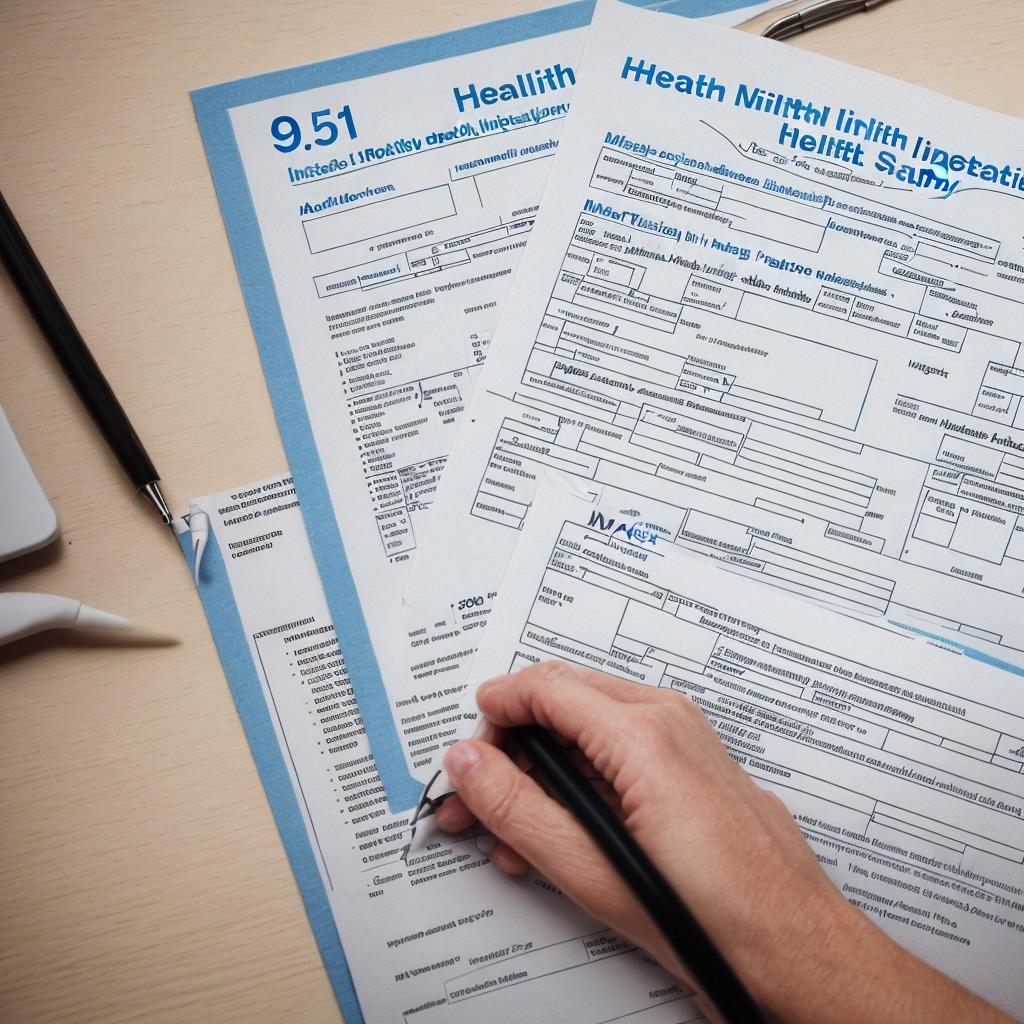Correctly Completing Health Insurance Forms: Common Errors

You’re filling out your health insurance forms, but are you doing it correctly? Avoiding common mistakes is essential to ensure accuracy.
In this article, we’ll guide you through the key information to include and provide tips for avoiding errors. Remember, double-checking your completed forms is crucial.
Let’s dive into the world of health insurance forms and discover how to navigate them without stumbling over common errors.
Key Takeaways
- Accurate completion of health insurance forms is crucial for receiving appropriate benefits and smooth claims processing.
- Common mistakes in health insurance forms include forgetting to provide the correct policy number, incorrectly entering personal information, incomplete or inaccurate medical history, and omitting required signatures and dates.
- Tips for avoiding errors in health insurance forms include carefully reviewing and assessing the information provided, verifying personal information, inputting the policy number accurately, providing complete and detailed medical history, and signing and dating the forms where required.
- Key information to include in health insurance forms includes current medical conditions, information about previous surgeries, allergies, and any other relevant details that help insurers offer the best coverage and care possible.
The Importance of Accuracy in Health Insurance Forms
You must ensure that you accurately complete all health insurance forms to avoid potential issues and delays. Health insurance forms are an essential part of the healthcare process, as they contain vital information that determines your coverage and eligibility. Accurate completion of these forms is crucial to ensure that you receive the appropriate benefits and that your claims are processed smoothly.
When filling out health insurance forms, it’s important to provide all required information, such as your personal details, insurance policy number, and medical history. Double-checking the accuracy of the information you provide is essential to avoid any discrepancies that may lead to claim denials or delays in processing. Make sure to review the forms thoroughly before submitting them to ensure that all sections are completed correctly and legibly.
By accurately completing health insurance forms, you aren’t only saving yourself from potential issues but also helping the healthcare system function more efficiently. Mistakes in these forms can lead to delays in receiving medical services, confusion for healthcare providers, and unnecessary financial burden for both you and the insurance company.
Understanding the common mistakes in health insurance forms will further help you in ensuring accuracy and avoiding potential issues.
Understanding the Common Mistakes in Health Insurance Forms
One common mistake in health insurance forms is forgetting to provide the correct policy number. This is a crucial piece of information that ensures accurate processing of your claims and prevents any delays or denials in coverage. Failing to include the correct policy number can lead to confusion and administrative errors, resulting in potential financial burdens for you.
Here are three common consequences of failing to provide the correct policy number:
- Claim denials: Without the correct policy number, insurance companies may reject your claims, leaving you responsible for the full cost of medical services. This can lead to unexpected expenses and financial strain.
- Delayed processing: Incorrect policy numbers can cause delays in processing your claims, resulting in longer wait times for reimbursement. This can be particularly frustrating when you’re in need of urgent medical care or facing significant medical expenses.
- Incorrect coverage determination: Providing the wrong policy number can lead to incorrect coverage determinations. This means that you may not receive the benefits or services that your policy should provide, resulting in out-of-pocket expenses that should have been covered by your insurance.
To avoid these consequences, always double-check that you have accurately entered your policy number on health insurance forms. Taking the time to ensure this information is correct can save you from unnecessary headaches and financial burdens in the future.
Tips for Avoiding Errors in Health Insurance Forms
To ensure accurate completion of health insurance forms, remember to carefully review and assess the information provided before submitting them. Taking the time to double-check the forms can help you avoid common errors and ensure that your claims are processed smoothly.
One important tip is to verify that all personal information, such as your name, address, and date of birth, is correctly entered. Mistakes in these details can lead to delays or even denials in coverage. Additionally, make sure to input your policy number accurately, as any discrepancies can result in confusion and further complications.
Another key aspect to consider is providing complete and detailed information about your medical history, current medications, and any pre-existing conditions. Incomplete or inaccurate information can lead to claim denials or even investigations into potential fraud.
Lastly, remember to sign and date the forms where required. Omitting these essential steps can result in delays in processing your claims.
Key Information to Include in Health Insurance Forms
When completing health insurance forms, it’s important to include key information such as your current medical conditions, previous surgeries, and any allergies you may have. Providing this information ensures that your health insurance provider has a comprehensive understanding of your medical history, enabling them to offer you the best coverage and care possible.
Here are three reasons why including this key information is crucial:
- Accurate Diagnosis: By disclosing your current medical conditions, you allow your insurer to accurately assess the risks associated with your health. This information helps them determine the appropriate coverage for your specific needs, ensuring that you receive the necessary treatments and medications.
- Effective Treatment: Previous surgeries play a significant role in evaluating your health insurance needs. Sharing this information enables your insurer to understand any ongoing or potential complications, ensuring that you have access to the necessary follow-up care and support.
- Allergy Management: Including any allergies you may have is vital for your safety and well-being. By informing your insurer about your allergies, they can help you navigate potential risks and provide you with appropriate coverage for medications or treatments that may be necessary.
How to Double-Check Your Completed Health Insurance Forms
Before submitting your completed health insurance forms, make sure to double-check them for any errors or missing information. Taking the time to review your forms can help ensure that your claims are processed smoothly and that you receive the coverage you need.
Start by carefully reviewing each section of the form, paying attention to details such as your personal information, policy number, and dates of service. Verify that all the information is accurate and up-to-date.
Next, check that you have provided all the necessary supporting documents, such as medical records or receipts. Make sure they’re attached securely to the form and that they’re legible and complete. If any documents are missing or unclear, contact your healthcare provider or insurance company for assistance.
Additionally, make sure you have filled out all required fields and answered all the questions. Leaving any sections blank could result in delays or denials of coverage. Take the time to read each question carefully and provide accurate and complete answers.
Finally, review the form for any spelling or grammatical errors. While these may seem minor, they can lead to confusion or misunderstandings when processing your claim. Correct any mistakes and ensure that the form is easy to read and understand.
Frequently Asked Questions
What Are Some Common Mistakes to Avoid When Filling Out Health Insurance Forms?
When filling out health insurance forms, avoid common mistakes that could lead to complications. Ensure you provide accurate personal information, double-check your entries, and don’t forget to sign and date the forms.
How Can I Ensure That My Health Insurance Forms Are Accurate and Error-Free?
To ensure accurate and error-free health insurance forms, pay attention to details, double-check information, and follow instructions carefully. Take your time, use clear handwriting, and review the completed forms before submitting.
What Information Is Important to Include in Health Insurance Forms?
Include important information in health insurance forms such as personal details, medical history, policy numbers, and contact information. Make sure to double-check for accuracy and completeness to avoid errors or delays in processing.
Are There Any Tips or Tricks for Double-Checking My Completed Health Insurance Forms?
To double-check your completed health insurance forms, review each section carefully. Make sure all personal and policy information is accurate. Don’t forget to sign and date the forms before submitting them.
What Are the Consequences of Making Errors on Health Insurance Forms?
Making errors on health insurance forms can lead to delays in processing claims, denial of coverage, or even financial penalties. It’s crucial to double-check your completed forms to avoid these consequences.



